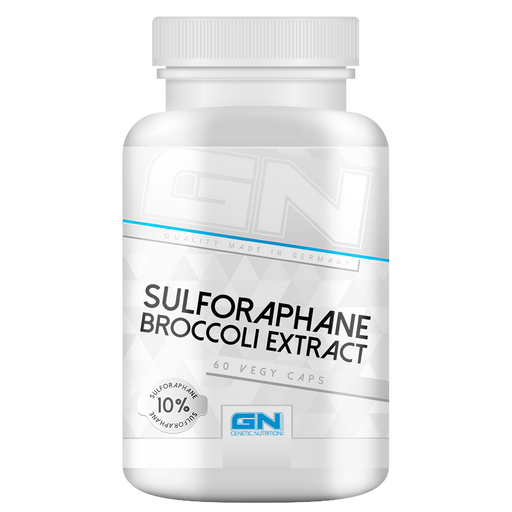Sulforaphane
-
 Save 11%
Save %
Original price €16,90Original price €16,90 - Original price €16,90Original price €16,90Current price €15,04€15,04 - €15,04Current price €15,04| /
Save 11%
Save %
Original price €16,90Original price €16,90 - Original price €16,90Original price €16,90Current price €15,04€15,04 - €15,04Current price €15,04| /Sulforaphane Broccoli Extract · 60 capsules
GN Laboratories2 reviewsThe healthy broccoli plant extract, which can promote cardiovascular health, support detoxification of the body and improve immune function Suppor...
View full detailsOriginal price €16,90Original price €16,90 - Original price €16,90Original price €16,90Current price €15,04€15,04 - €15,04Current price €15,04| /Save 11% Save %
Sulforaphane is a chemical found in certain types of vegetables such as broccoli, cabbage and cauliflower.
Sulforaphane is used to prevent prostate cancer and other types of cancer.
How does sulforaphane work?
Sulforaphane may increase the death rate of cancer cells.
How effective is sulforaphane?
There is not enough scientific data to make a statement about the effectiveness of sulforaphane when used to prevent cancer. Further scientific research is needed to evaluate the effectiveness of sulforaphane in this application.
Safety and side effects
Sulforaphane is safe when used in the amounts found in food. However, there is not enough information on whether sulforaphane is safe and harmless when used orally as a medicine.
Precautions and warnings
Pregnancy and lactation: Sulforaphane is safe during pregnancy and lactation in normal amounts found in food, but there is not enough information on the safety of larger amounts used as medicine.
Interactions
Care should be taken when combining sulforaphane with the following medications
*Drugsthat are broken down by the liver (cytochrome P450 1A2 (CYP1A2) substrates)*.
Some drugs are broken down by the liver. Sulforaphane may reduce the rate at which the liver breaks down certain drugs. Taking sulforaphane in combination with drugs that are broken down by the liver may increase the effects and side effects of some drugs. For this reason, you should consult your doctor before taking sulforaphane if you are taking medications that are broken down by the liver.
Dosage
An appropriate dosage of sulforaphane depends on various factors such as age, state of health and others. At the present time, there is insufficient scientific data to make a statement about appropriate dosage ranges for sulforaphane. For this reason, you should follow the dosage instructions on the label and/or consult a doctor or pharmacist before use.
References
- Barcelo S, Mace K, Pfeifer AM, Chipman JK. Production of DNA strand breaks by N-nitrosodimethylamine and 2-amino-3-methylimidazo[4,5-f]quinoline in THLE cells expressing human CYP isoenzymes and inhibition by sulforaphane. Mutat Res 1998;402:111-20. view abstract.
- Brooks JD, Paton V. Potent induction of carcinogen defense enzymes with sulforaphane, a putative prostate cancer chemopreventive agent. Prostate Cancer Prostatic Dis 1999;2:S8. View abstract.
- Chiao JW, Chung FL, Kancherla R, et al. Sulforaphane and its metabolite mediate growth arrest and apoptosis in human prostate cancer cells. Int J Oncol 2002;20:631-6. View abstract.
- Conaway CC, Getahun SM, Liebes LL, et al. Disposition of glucosinolates and sulforaphane in humans after ingestion of steamed and fresh broccoli. Nutr Cancer 2000;38:168-78. View abstract.
- Heiss E, Herhaus C, Klimo K, et al. Nuclear factor kappa B is a molecular target for sulforaphane-mediated anti-inflammatory mechanisms. J Biol Chem 2001;276:32008-15. view abstract.
- Hintze KJ, Keck AS, Finley JW, Jeffery EH. Induction of hepatic thioredoxin reductase activity by sulforaphane, both in Hepa1c1c7 cells and in male Fisher 344 rats. J Nutr Biochem 2003;14:173-9. View abstract.
- Nestle M. Broccoli sprouts in cancer prevention. Nutr Rev 1998;56:127-30. View abstract.
- Park EJ, Pezzuto JM. Botanicals in cancer chemoprevention. Cancer Metastasis Rev 2002;21:231-55. . View abstract.
- Vermeulen M, van Rooijen HJ, Vaes WH. Analysis of isothiocyanate mercapturic acids in urine: a biomarker for cruciferous vegetable intake. J Agric Food Chem 2003;51:3554-9. View abstract.
- Wu L, Noyan Ashraf MH, Facci M, et al. Dietary approach to attenuate oxidative stress, hypertension, and inflammation in the cardiovascular system. Proc Natl Acad Sci U S A 2004;101:7094-9. view abstract.
- Zhang J, Svehlikova V, Bao Y, et al. Synergy between sulforaphane and selenium in the induction of thioredoxin reductase 1 requires both transcriptional and translational modulation. Carcinogenesis 2003;24:497-503.. View abstract.
- Zhang Y, Callaway EC. High cellular accumulation of sulphoraphane, a dietary anticarcinogen, is followed by rapid transporter-mediated export as a glutathione conjugate. Biochem J 2002;364:301-7. View abstract.

